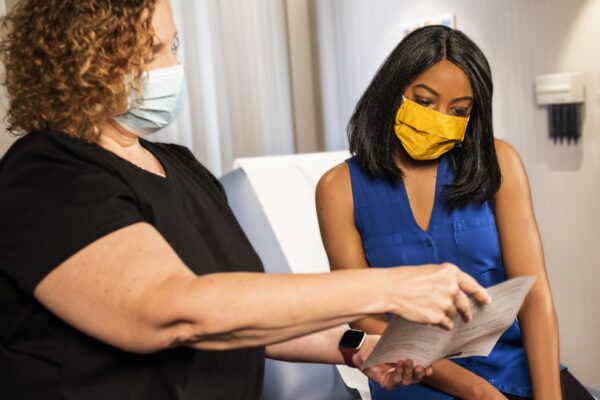
1300 244 910

Resources and tips for managing stress and
managing your own health while working in
pharmacy during the pandemic.
Living through the COVID-19 pandemic will be challenging in many ways both personally and at work. It is important to pay attention to your own health and wellbeing so that you can continue to care for others as a health professional.
Browse through our resources below and if you need support or a listening ear, please call our helpline on 1300 244 910 between 8:00am and 11:00pm AEDT every day of the year.

Allow time for wellbeing
Be aware of how you are feeling and respond to your needs for rest and nourishment, whilst keeping active. Some other tips include:
Connect with others and be aware of the needs of your colleagues
Maintain your social connections with colleagues, family and friends by phone or online or with a virtual group (for instance, by using WhatsApp, Signal or other services). Here are some other tips:

It is important to look out for your colleagues especially as so many people are struggling with mental health during these stressful times. Don’t be afraid to ask others if they’re ok or would like to talk. It’s really important to prioritise wellbeing at this time. Read more by clicking on the article below!

This helpful article talks about how to look for signs of depression in others, particularly in the workplace, and how you workplaces can help anyone who is having mental health difficulties.
The Pharmacists’ Support Service is available to support all Australian pharmacists, interns and pharmacy students. In addition, during the COVID-19 pandemic, PSS will accept calls for support from pharmacy assistants and pharmacy technicians. The service is available every day of the year from 8am to 11pm AEDT on 1300 244 910. Support is provided by trained volunteers who are all pharmacists or retired pharmacists.

Why do I need to take extra care of my mental health during COVID-19?
Protecting your mental health will keep you functioning at your peak. Humans are hardwired to be afraid of the unknown and of anything that appears random and uncontrollable. The COVID-19 pandemic is an unprecedented event for us all. Despite education and knowledge, pharmacists are just as likely to be feeling anxious as everyone else.
For pharmacists and pharmacy staff, knowledge of the risk of infection and the possible outcome can actually exacerbate fear, particularly as you read about the increased death rates in health professionals in China, Italy, Spain, Portugal, the United Kingdom and the United States of America. This is a normal response in these circumstances and such feelings are not a sign of weakness and it is important to acknowledge how you are feeling.
In addition, there is a huge amount of information about the COVID-19 pandemic everywhere we turn. Pharmacy publications, social media, pharmacy organisations, workplaces, and the news are all focusing on the topic with little respite. Your usual methods of diversion and relaxation may have become less available as social isolation is put into place to reduce the spread of infection.
Be self-aware and recognise those things that may be causing you stress and your own warning signs of stress. Be aware of your own tendency to be self-critical and have some self-compassion. Don’t be so hard on yourself and others when things do not go according to plan. Be kind to yourself and to others.
Allow time for wellbeing
Be aware of how you are feeling and respond to your needs for rest and nourishment, whilst keeping active:
To relax outside work, try to do something totally unrelated to work every day. Something which distracts you and makes you smile, even for a short period of time. Intentionally take some time out to disconnect from the news, social media, politicians, constant case updates, and other sources of information about COVID-19.
Engage in your hobbies and interests and if you can’t undertake your usual activities try something new which you can do at home; for example, cooking new recipes, learning a language, or doing an online course.
If you sense your anxiety is getting a bit out of hand reach out for help to debrief and reflect on how things are going. Access your support network; these could be friends, family and work colleagues, as well as professional supports such as your GP or psychologist and let them know how you are feeling. PSS is also available every day of the year between 8am and 11pm AEDT on 1300 244 910.
Draw on skills you have used in the past to help manage previous life adversities or difficult situations. Think about what has helped before and how you can apply these strategies now. This could be as simple as breathing techniques to slow your heart rate and stop you becoming over-whelmed. Other stress reducing activities may be regular walks in nature or some physical exercise.

Speak to a psychologist or counsellor if your usual methods of managing stress are not working; they can help you develop other strategies to manage your own personal stress.
Be nice to your colleagues and patients. Treat them well and with respect and show them you care. Practise kindness and compassion in all aspects of your life.
Managing your mental health while in self-isolation or quarantine
There are a number of ways to support your mental health during periods of self-isolation or quarantine:
Working from home can make it harder to maintain a healthy balance and can make it difficult on family members who are not working or studying. Going to work requires some discipline that can be lost when working from home. Find a way to keep that discipline by:
Even if you are going out to work during COVID-19, you may still be experiencing feelings of isolation and loneliness. You may also feel that others do not understand the stressors you may be feeling while working in healthcare during a pandemic. It’s absolutely normal to be feeling this way, especially with restrictions that may limit you from socialising as usual with family and friends. If you live alone or away from family, this can also be a difficult time.
Here are a few ideas of things you can do while at home:

Above all, if you are feeling isolated, reach out to someone. The PSS helpline is available 365 days a year, from 8:00am until 11:00pm on 1300 244 910. You can also call Lifeline on 13 11 14 for support. It is important to acknowledge your feelings and to look after yourself.
If you have to isolate or quarantine but you are not unwell, you may wish to try to do some work from home if possible. While you should relax and enjoy your time off if you can, if you are a manager or Pharmacist-in-Charge you may wish to complete some administration or other tasks at home, especially if your workplace is short-staffed during this time. Of course, this is something you would have to work out with your workplace. We have compiled a few ideas of tasks you can do remotely. While it is important to have a routine during a period of isolation, it is also important not to overwork yourself! Keep that in mind while you look through the list below.
With all the technology that is available now, you might be surprised at what can be completed remotely if needed. Discuss options for flexible work with your organisation, but keep in mind that if you are on sick leave you should be caring for yourself and working on getting better!

This PSS and AJP webinar on “COVID-19: from surviving to thriving” is available here. You may need to create a free AJP account to view this content.

This PSS and AJP webinar on “COVID-19: Leading teams through unprecedented uncertainty” is available here. You may need to create a free AJP account to view this content.

This AJP webinar on “Staying afloat on the wave of COVID-19 and beyond” is available here. You may need to create a free AJP account to view this content.

This AJP and PSS webinar on “Mental Health in the Pharmacy Profession” is available here. You may need to create a free AJP account to view this content.
Watch the video below or click through to watch on Youtube for help with how to respond effectively to the Coronavirus crisis and tips for grounding yourself during times of stress.

Read the Beyond Blue article “On the frontline: how healthcare workers can support themselves and each other”, which contains information about working in healthcare during the pandemic, by clicking the link below.

Black Dog Institute has many resources available to support mental health. ‘TEN – The Essential Network for Health Professionals’ helps healthcare workers find resources and support to manage burnout and maintain good mental health. Click below to visit their page.

The Pandemic Kindness Movement was created by clinicians across Australia, working together to support all health workers during the COVID-19 pandemic. Click below to visit their page.

The Health Victoria website has a section dedicated to workplace health and wellbeing for healthcare workers. Explore the resources they have available by clicking the link below.
Many organisations have created resources specifically to provide support during the COVID-19 pandemic. Browse through the links below.
| Australian Psychological Society | www.psychology.org.au/COVID-19-Australians |
| Beyond Blue | coronavirus.beyondblue.org.au/ |
| Black Dog Institute | www.blackdoginstitute.org.au/coronavirus-anxiety-resources |
| Phoenix Australia | www.phoenixaustralia.org/coronavirus-covid-19/ |
| Multicultural Commission | www.multiculturalcommission.vic.gov.au/coronavirus-covid-19-mental-health-and-wellbeing |
| SANE Australia | www.sane.org/information-stories/the-sane-blog/wellbeing/covid-19-take-care-mental-health-isolation |
| SuperFriend | superfriend.com.au/resources/covid-19-support/ |
| PSA web resources | www.psa.org.au/coronavirus |
| PGA web resources | www.guild.org.au/resources/business-operations/COVID-19-Information |
| SHPA web resources | www.shpa.org.au/news/covid19-information-hub |
We have provided some further resources which are available for other issues that may arise due to the COVID-19 pandemic. It may feel overwhelming at times, especially as a frontline worker in pharmacy, but there are resources out there to help you.
| There is support available for those who have suffered financially during the pandemic. This may include income loss due to quarantine or isolation if your workplace has become an exposure site — be aware that this may depend on your state government guidelines. Available support may change as the situation develops. Be on the lookout for scammers and follow the advice from a reputable source such as your state government website. National Debt Helpline ndh.org.au/debt-problems/covid19/ National Recovery and Resiliency Agency recovery.gov.au/get-support/covid-19-support Australian Government www.australia.gov.au/work-and-financial-support Victorian Government www.coronavirus.vic.gov.au/financial-and-other-support-coronavirus-covid-19 New South Wales Government www.nsw.gov.au/covid-19/financial-support South Australian Government www.covid-19.sa.gov.au/school-and-community/financial-support-for-individuals Queensland Government www.covid19.qld.gov.au/government-actions/financial-support-for-individuals Tasmanian Government www.coronavirus.tas.gov.au/families-community/financial-services-and-support www.coronavirus.tas.gov.au/families-community/emergency-relief-support There is also an article here with general advice about reducing financial stress for healthcare workers. There are helplines for other areas available on our Useful Links page. |
| Unfortunately healthcare workers may sometimes experience racism and harassment while at work. Have you experienced racism at this time? It can be very difficult and hurtful to experience racism and you may not know who to turn to if this happens. Explore these resources for some advice on how to proceed; while some of them are based in a specific state, the advice may help you regardless of your location. If you need information on when or how to lodge a complaint these resources may help you with this. You can also call our helpline for emotional support and advice. The Multicultural Commission www.multiculturalcommission.vic.gov.au/experienced-racism-heres-what-you-can-do Beyond Blue www.beyondblue.org.au/who-does-it-affect/the-invisible-discriminator/respond-to-racism Victoria Police www.police.vic.gov.au/prejudice-and-racial-and-religious-vilification Australian Human Rights Commission humanrights.gov.au/our-work/commission-general/covid-19-information ReachOut Australia au.reachout.com/articles/what-to-do-if-youre-experiencing-racism There is also some information available regarding discrimination laws in regards to illness, race, disability and more. Tasmanian Government www.coronavirus.tas.gov.au/families-community/covid-19-and-discrimination-law |
| Perhaps you are a pharmacy student or studying while in your intern year. Regardless, it can be overwhelming to juggle things like study, work, home life, and more, especially with the added stress of COVID-19. You may have questions and concerns about working in healthcare during a public health crisis. If this is you, you may be able to find support from your institution or student groups – reach out for help if you need it! The National Australian Pharmacy Students’ Association (NAPSA) is a great association that enables pharmacy students to find support and advice from peers. We have also provided some resources here which may help. Remember, our helpline is also open to pharmacy students and interns. If you are feeling overwhelmed, give us a call! ReachOut Australia au.reachout.com/collections/stressed-about-study-during-coronavirus Coronavirus Vic Gov www.coronavirus.vic.gov.au/students Study Australia: Information for International Students www.studyinaustralia.gov.au/english/study-in-australia-student-support/financial-support/welfare-support Student Wellbeing Hub – Resources for Students studentwellbeinghub.edu.au/educators/covid-19/ |
| Unfortunately work-related violence is something that people may experience while working in pharmacy. During the COVID-19 pandemic, there is a greater possibility that patients or customers, in particular, may become aggressive during stock shortages and increased wait times. If you have experienced anything traumatic, you can find some resources on our Trauma page. There is more information about work-related violence in this WorkSafe fact sheet, here. |
Support for Pharmacists 2021 Designed & Developed by VW Themes
| Cookie | Duration | Description |
|---|---|---|
| cookielawinfo-checkbox-analytics | 11 months | This cookie is set by GDPR Cookie Consent plugin. The cookie is used to store the user consent for the cookies in the category "Analytics". |
| cookielawinfo-checkbox-functional | 11 months | The cookie is set by GDPR cookie consent to record the user consent for the cookies in the category "Functional". |
| cookielawinfo-checkbox-necessary | 11 months | This cookie is set by GDPR Cookie Consent plugin. The cookies is used to store the user consent for the cookies in the category "Necessary". |
| cookielawinfo-checkbox-others | 11 months | This cookie is set by GDPR Cookie Consent plugin. The cookie is used to store the user consent for the cookies in the category "Other. |
| cookielawinfo-checkbox-performance | 11 months | This cookie is set by GDPR Cookie Consent plugin. The cookie is used to store the user consent for the cookies in the category "Performance". |
| viewed_cookie_policy | 11 months | The cookie is set by the GDPR Cookie Consent plugin and is used to store whether or not user has consented to the use of cookies. It does not store any personal data. |